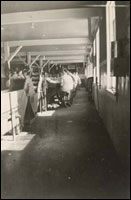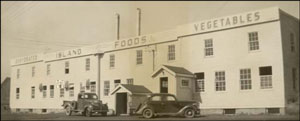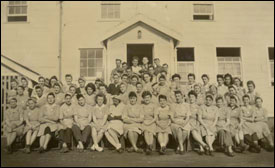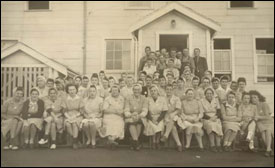In the fall of 1942, Islanders learned that the government planned to subsidize several vegetable drying plants in the Maritimes and that one of them had been assured for PEI. Vegetables in a dried state could save valuable shipping space when they were sent to Great Britain for the use of the armed forces.
A dehydration expert from Ottawa visited the province in October and the announcement came in November that Summerside would be the site. Island Foods Incorporated was to process vegetables for the federal Agricultural Supplies Board. There had been considerable background work by the town officials, the Board of Trade and the local members of the Associated Shippers to acquire the industry.
The construction of the 130 x 65 foot plant gave work to several local firms. Morrison & MacRae built the ten-foot deep foundation and M. F. Schurman Ltd. erected the wooden frame two-storey structure. The plans had been drawn by Charlottetown architect James H. Harris. The Trask Well Company managed by Vaughan Groom had the contract for the well.
The president of Island Foods Ltd. was Austin Scales and Lucas R. Allen was the secretary and resident director. Mr. Scales of Freetown addressed the Board of Trade in January 1943 to explain how potatoes would be processed. In February a dehydration expert visited the plant, which was to open in three weeks time. However, there were a few delays including a strike staged by workers installing the sewer.
It was late April before any potatoes were processed on an experimental basis. In early May a dinner was held at the Clifton Hotel to mark the official opening. An account of the evening indicated that dehydrated potatoes in a reconstituted state were served as part of the meal. The reporter noted, " … the potatoes were indistinguishable from ordinary cooked potatoes." The special speaker from the Central Experimental Farm in Ottawa talked about the new science of dehydration and indicated that over one-half of the potato processing would be in the Maritimes.
Lt. Gov. LePage inspected the plant in late May as did the Summerside Mayor and Council members. This was just before the plant stopped work for the season. Changes were made in the equipment in June for drying Irish Moss, but this was not a successful venture.
 After the next potato harvest the plant re-opened. Over 100 women along with 25 men were needed as workers on two shifts. Boarding rooms were sought for female workers who came to Summerside from outlying areas.
After the next potato harvest the plant re-opened. Over 100 women along with 25 men were needed as workers on two shifts. Boarding rooms were sought for female workers who came to Summerside from outlying areas.The plant manager was Dr. E. J. Reedman and the foreman was Percy Hickey. By mid- October the plant was processing 9-14 tons a day using one shift of about 65 people. With two shifts at full capacity the plant could handle about 25 tons daily, with the output of the finished product at 3 ½ tons translating to a weight ratio of seven to one. The preferred variety of potato was Green Mountain because there was too much waste from the Cobbler variety. The end product was shipped out on railway cars.
The waste, comprised of potato peelings, was hauled down to the Summerside harbour and dumped with the assumption that decomposition would take place over time. That dumping eventually became a bit of an issue in the town. At a Board of Trade meeting in November 1945 there was reference to the "disagreeable smell" being a detriment to the local tourism industry. In the meantime L. R. Allen, secretary of the Board of Directors of Island Foods, had encouraged the Board of Trade to lobby government for a starch plant, which could make use of the peelings.
A scarcity of potatoes in the fall of 1943 meant that the plant operated with only one shift that winter. About 300 tons of dehydrated product representing 100 carloads of potatoes were processed over seven months.
 In September 1944, the plant re-opened with about 70 people working one shift. A second shift started 6 November and over the winter about 175 people, 40 of them men, were steadily employed. The payroll was roughly $3000 per week.
In September 1944, the plant re-opened with about 70 people working one shift. A second shift started 6 November and over the winter about 175 people, 40 of them men, were steadily employed. The payroll was roughly $3000 per week. In May 1945, the largest shipment of dehydrated potatoes ever sent overseas from Summerside left the province. Production ended for the season and a staff of twelve was kept on for maintenance. In August a huge sign was constructed for the plant. "The sign will be 130 feet long, which is probably a record for the Maritimes as far as the length of signs is concerned" was the comment made by the Journal.
It was announced in Sept 1945 that the plant had a contract with the British Ministry of Food to supply 900 tons of dehydrated product over the season. Suddenly in November the management received a telegram from the Special Products Board in Ottawa that the plant was to cease operations. Just as suddenly this decision was reversed by telegram in December. The same Board asked the plant to re-open for a full season. There was a delay due to a shortage of coal, but by February 1946 a shipment was ready to be sent to Europe.
In August 1946, the shareholders of the company learned at their annual meeting that no contracts had been secured for the coming season. President Mr. Scales also informed them that the Summerside Water and Sewerage Commission had forbidden the plant's use of the town's sewage system. The situation was discussed by the Board of Trade at its November 1946 meeting.
The building was sold to the Summerside Co-operative Association Ltd. in May 1957 for storage purposes. DeBlois Likely Ltd, a wholesale grocery firm from Charlottetown, acquired it in June 1963. That company was the owner when the structure burned down in November 1969.
| Related Articles | Related Images | Related Memories | Related Websites | Inflation Calculator |
| Home Page | Site Map | Contact Us | Wyatt Heritage Properties |







